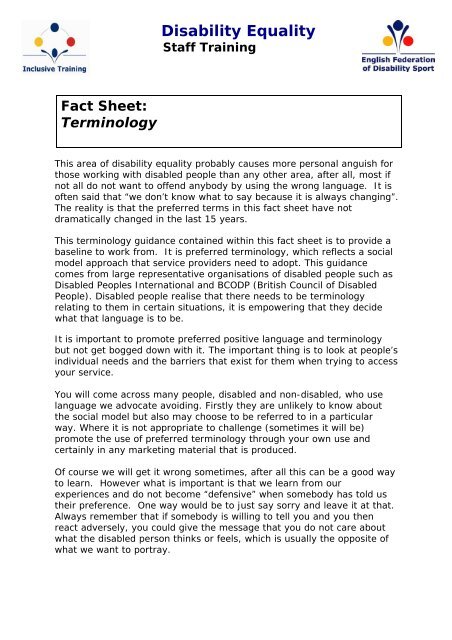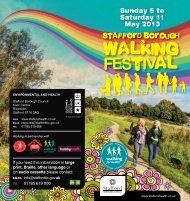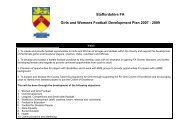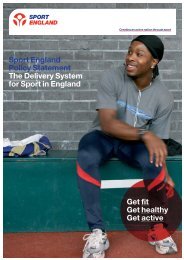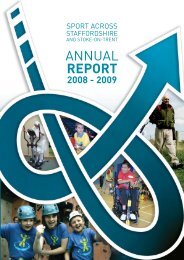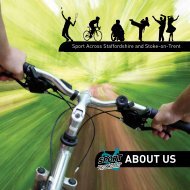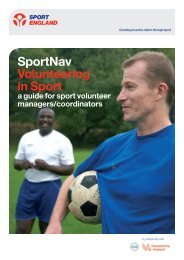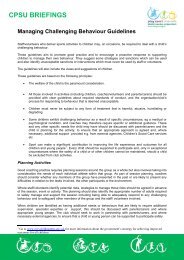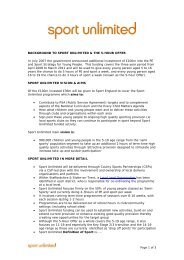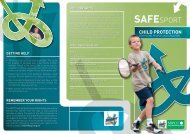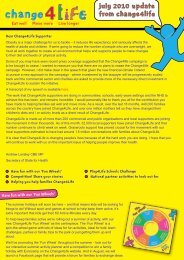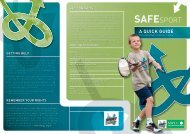EFDS Disability Terminology - Sport Across Staffordshire
EFDS Disability Terminology - Sport Across Staffordshire
EFDS Disability Terminology - Sport Across Staffordshire
You also want an ePaper? Increase the reach of your titles
YUMPU automatically turns print PDFs into web optimized ePapers that Google loves.
<strong>Disability</strong> Equality<br />
Staff Training<br />
Fact Sheet:<br />
<strong>Terminology</strong><br />
This area of disability equality probably causes more personal anguish for<br />
those working with disabled people than any other area, after all, most if<br />
not all do not want to offend anybody by using the wrong language. It is<br />
often said that “we don’t know what to say because it is always changing”.<br />
The reality is that the preferred terms in this fact sheet have not<br />
dramatically changed in the last 15 years.<br />
This terminology guidance contained within this fact sheet is to provide a<br />
baseline to work from. It is preferred terminology, which reflects a social<br />
model approach that service providers need to adopt. This guidance<br />
comes from large representative organisations of disabled people such as<br />
Disabled Peoples International and BCODP (British Council of Disabled<br />
People). Disabled people realise that there needs to be terminology<br />
relating to them in certain situations, it is empowering that they decide<br />
what that language is to be.<br />
It is important to promote preferred positive language and terminology<br />
but not get bogged down with it. The important thing is to look at people’s<br />
individual needs and the barriers that exist for them when trying to access<br />
your service.<br />
You will come across many people, disabled and non-disabled, who use<br />
language we advocate avoiding. Firstly they are unlikely to know about<br />
the social model but also may choose to be referred to in a particular<br />
way. Where it is not appropriate to challenge (sometimes it will be)<br />
promote the use of preferred terminology through your own use and<br />
certainly in any marketing material that is produced.<br />
Of course we will get it wrong sometimes, after all this can be a good way<br />
to learn. However what is important is that we learn from our<br />
experiences and do not become “defensive” when somebody has told us<br />
their preference. One way would be to just say sorry and leave it at that.<br />
Always remember that if somebody is willing to tell you and you then<br />
react adversely, you could give the message that you do not care about<br />
what the disabled person thinks or feels, which is usually the opposite of<br />
what we want to portray.
<strong>Disability</strong> Equality<br />
Staff Training<br />
Preferred terminology is about being socially aware, respecting people, and appreciating that what<br />
we say and how we say it can have a profound effect on people.<br />
<strong>Terminology</strong><br />
Prefer Avoid Explanation<br />
Preferred <strong>Terminology</strong><br />
1<br />
the disabled Grouping everyone together in a<br />
disempowering way, reflecting medical<br />
model.<br />
2 she is a stroke<br />
victim<br />
<br />
Disabled people are neither victims or<br />
tragic.<br />
3 spastic In dictionary medical term – a form of<br />
cerebral palsy. Used in a negative way.<br />
Name calling, playground culture.<br />
4 ….has cerebral palsy <br />
Preferred term.<br />
Preferred term is a disabled<br />
person / disabled people.<br />
Preferred term is She has had a<br />
stroke.<br />
Preferred term is a disabled<br />
person<br />
5 the deaf As above with The disabled. Preferred term is people with<br />
hearing impairments.<br />
6 …. has learning <br />
Preferred term.<br />
difficulties<br />
7 ….is partially sighted ‘Sighted’ is based on the concept of<br />
‘normality’ therefore being partially<br />
sighted is deviation from normality.<br />
Preferred term is people with<br />
visual impairments<br />
8<br />
….is handicapped Outdated considered offensive due to<br />
connotations with begging i.e. cap in<br />
hand. Preferred term is disabled people.<br />
Preferred term is a disabled<br />
person / disabled people.
<strong>Disability</strong> Equality<br />
Staff Training<br />
<strong>Terminology</strong> Prefer Avoid Explanation Preferred <strong>Terminology</strong><br />
9<br />
….is wheelchair<br />
bound<br />
10 a person with a<br />
disability<br />
<br />
<br />
Implies person spends all their time in<br />
the wheelchair and cannot get out, even<br />
that they are ‘tied’ to their chairs.<br />
Disabled people do not sleep in their<br />
chairs. They use the chair to go about<br />
their everyday activities.<br />
Medical model perspective implies a<br />
person’s impairment or medical condition<br />
causes the disability. You firmly attach<br />
the disability to the person with this<br />
phrase when it’s not it’s with society.<br />
11 ….suffers from Most disabled people are not suffering but<br />
‘have’ a particular impairment.<br />
Disempowering.<br />
12 able-bodied Implies disabled peoples bodies are<br />
‘unable’. Individual model perspective.<br />
Preferred term is wheelchair<br />
user.<br />
Preferred term is disabled people<br />
/ a disabled person.<br />
Preferred term is has. Eg. she/he<br />
has cerebral palsy<br />
Preferred term non-disabled<br />
people.<br />
There are times when you might need to describe a person’s impairment, in which case for the most part the<br />
terms below will be acceptable:<br />
Mental health service users<br />
Mental health issues<br />
People with learning difficulties<br />
People with visual impairments (blind if totally blind)<br />
People with hearing impairments (deaf if profoundly deaf)<br />
People with speech impairments
<strong>Disability</strong> Equality<br />
Staff Training


